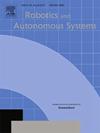Neural network-based intelligent perception guaranteed performance control for mechanical arm
IF 4.3
2区 计算机科学
Q1 AUTOMATION & CONTROL SYSTEMS
引用次数: 0
Abstract
We concern with the intelligent perception control of a mechanical arm dynamic system with unknown initial state values, parameter perturbations, and external disturbances. Unlike existing prescribed performance control (PPC) methodologies which fail to preset convergence time via parameter setting, we propose a new type of PPC with predefined convergence time to impose prescribed behaviors on angle tracking errors. To accomplish such aim, we firstly define a predefined time stability criterion with an upper bound of convergence time that can be set in advance, and then we further convert the actual tracking error variable into a new variable with an initial value of zero by utilizing the error conversion function. Furthermore, a boundary amplitude intelligent extension algorithm is designed based on tracking error for performance constraint function (PCF), and meanwhile the radial basis function neural network (RBFNN) is adopted to approximate the mechanical arm system model. On this basis, a new PPC approach guaranteeing predefined convergence time is addressed for the mechanical arm system. Finally, the obtained simulation results reveal that the angle tracking error always evolves inside the extended boundary of the PCF, to satisfy better prescribed transient and steady-state properties in comparison with existing technics.
基于神经网络的智能感知保证机械臂性能控制
我们关注具有未知初始状态值、参数摄动和外部干扰的机械臂动态系统的智能感知控制。现有的预定性能控制(PPC)方法无法通过参数设置来预设收敛时间,而本文提出了一种具有预定收敛时间的新型PPC方法,对角度跟踪误差施加预定行为。为了实现这一目标,我们首先定义了一个预定义的时间稳定性准则,该准则具有可提前设定的收敛时间上界,然后利用误差转换函数将实际跟踪误差变量转化为一个初始值为零的新变量。在此基础上,设计了一种基于性能约束函数(PCF)跟踪误差的边界幅值智能扩展算法,并采用径向基函数神经网络(RBFNN)逼近机械臂系统模型。在此基础上,针对机械臂系统提出了一种保证预定收敛时间的PPC方法。最后,仿真结果表明,与现有技术相比,该方法的角度跟踪误差始终在扩展边界内演化,能够更好地满足规定的瞬态和稳态特性。
本文章由计算机程序翻译,如有差异,请以英文原文为准。
求助全文
约1分钟内获得全文
求助全文
来源期刊

Robotics and Autonomous Systems
工程技术-机器人学
CiteScore
9.00
自引率
7.00%
发文量
164
审稿时长
4.5 months
期刊介绍:
Robotics and Autonomous Systems will carry articles describing fundamental developments in the field of robotics, with special emphasis on autonomous systems. An important goal of this journal is to extend the state of the art in both symbolic and sensory based robot control and learning in the context of autonomous systems.
Robotics and Autonomous Systems will carry articles on the theoretical, computational and experimental aspects of autonomous systems, or modules of such systems.
 求助内容:
求助内容: 应助结果提醒方式:
应助结果提醒方式:


